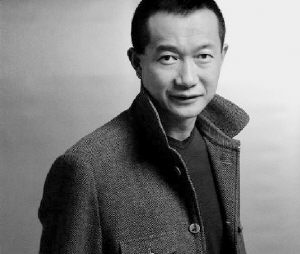 At a recent dress rehearsal of the opening scene of Tan Dun's much anticipated The First Emperor, the composer-conductor addresses the American singers on stage from the pit: "This is not Wagner, it's Chinese opera," as he waves his conductor's baton rhythmically in the air and instructs them to produce a more hollow vocal sound akin to Peking opera.
The chorus on stage--American opera singers playing the disgruntled people of the new Qin empire--frigidly adjust themselves to the unaccustomed musical moves by slapping their thighs and chanting in unison. The stone drummers attempt to recreate Qin Dynasty (221-206 B.C.) percussive sounds bare-handed while the ceramic players strike Tibetan singing bowls producing haunting sounds that resonate with the orchestral music. The opera's prophets--golden-fingered Shaman (played by Michelle Deyong) and acrobatic Yin-Yang master (played by Wu Hsin-kuo) try to mirror each other's movements and dramatic singing, even though they are distinctly different in build and sound.
Such unusual interactions are common in this daunting hybrid East-meet-West creation--back and forth translations, constant tweaking of score and creative improvisation are required for an Asian creative team to work with a leading American cast which includes famed tenor Placido Domingo singing the title role, soprano Elizabeth Futral as Princess Yueyang and Paul Groves as Gao Jianli.
An epic Chinese tale sung in English, the opera is innovative in its spirit. But the gargantuan project has sparked controversy and generated mixed reviews since it premiered at the Metropolitan Opera in New York, leading many to wonder what could have been lost in translation.
Bold experiment
Chinese composer Tan Dun has created many musical marvels for film and concert halls, and his oeuvre has oscillated between the ancient shamanic and modern avant-garde sounds. His latest musical experiment is perhaps the boldest of all. The First Emperor--an original opera production commissioned by the Metropolitan Opera (Met) is the most expensive opera to date, pushing spending over $2 million and taking 10 years to complete.
For the traditionally trained Chinese composer, it was not easy for Tan to create a new art form that balance and utilize Eastern and Western sensibilities and techniques.
To grow accustomed to the Western operatic tunes, Tan has industriously attended many Western opera performances at the Met for the past decade, and fervently studied the opera repertoire. "I believe that if artists want to bring the tradition forward, they must first embrace the past within their hearts. Then, miracles will happen," he says.
The First Emperor is an operatic odyssey, but the 49-year-old Tan believes the new production will create a "Marco Polo effect" and bring the essence of China to the West.
| 